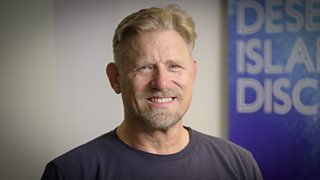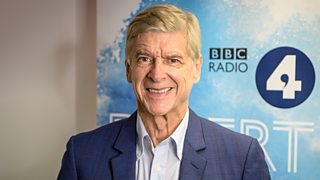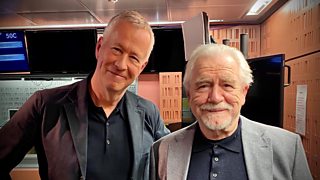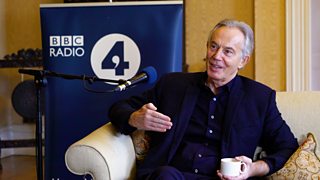10 things we learned when the Archbishop of Canterbury met Elif Shafak

In a new series for Radio 4 the Archbishop of Canterbury, Justin Welby, speaks with public figures whose work engages with big questions about humankind and who have an interesting relationship with religion and spirituality.
He meets the British-Turkish novelist and political scientist, Elif Shafak, whose works – translated into 55 languages – draw on diverse cultures and reflect her interest in history, philosophy and mysticism. Her stories often deal with extremely uncomfortable subjects – gender-based violence, child abuse, genocide – and give a voice to those on the margins of society.
In the state drawing room in Lambeth Palace, Justin and Elif discuss forgiveness as a colour spectrum, opening up about depression and the wisdom of grandmothers.
1. Elif thinks grandmothers deserve more recognition
Elif was born in Strasbourg, France, to Turkish parents. When their marriage failed, Elif’s mother took her to her maternal grandmother’s house, in what the author describes as a “very conservative, very patriarchal and inward-looking neighbourhood in Ankara.”
I’ve also felt very close to mystics, who have always been misfits throughout centuries...Elif Shafak
Elif’s mum was westernised, urban, modern and rational; her grandmother (who’d been denied an education) was more Eastern, more spiritual, more irrational. But she was a “wise woman,” says Elif. She would read coffee cups, melt lead to ward off the evil eye, and act as a “healer” to members of the local community. “My grandmother was a bit of a matriarch in that very patriarchal society,” says the author, who believes grandmothers often don’t get enough recognition. “In my case I think she left a big, big impact on me.”
2. Elif feels like a “failed mystic”
Elif says she’s not a religious person – she has two much doubt to be a believer – but she is someone who is interested in faith. “I’ve also felt very close to mystics, who have always been misfits throughout centuries, walking a very thin line between faith and doubt,” says the writer.
Walter Benjamin, the intellectual Jewish-German writer and cultural critic, was described as “a failed mystic”: someone who loved mysticism but also constantly failed at it. “I would call myself a failed mystic too,” says Elif.
3. Neither are afraid to say “I don’t know”
“For me, one of the most important things is moving from unconscious ignorance to conscious ignorance and then to awareness, in what I do,” states the Archbishop of Canterbury. When he’s visiting countries in conflict, for example, there’s often a deep sense that he doesn’t and can’t understand.
Elif agrees: “To be aware of our own ignorance or lack of knowledge on so many areas in life I think is so important.” We’ve lost sight of this, living in a world that is bombarded by information and misinformation too, she says. “There is a lot of information but very little knowledge and even less wisdom. I think they’re completely different things – information, knowledge and wisdom – but we tend to conflate.”
“To be able to say ‘I don’t know’ I think is incredibly important and that’s how I approach every subject when I’m writing a novel,” she says. “That’s my starting point: I don’t know so I’d better start learning.”
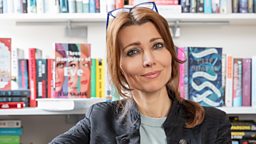
4. Elif is inspired by ancient philosophies, poetry and traditions
Whereas Justin has a profound desire to follow and serve God, Elif is wary of romanticising any one being. “I don’t want to put anyone on a pedestal,” she says. “Rather I want to learn from the ancient philosophies, from the ancient poetry, of centuries of traditions.” She refers to Sufi mystics like Rumi and Rabia and how their beliefs hold “something very precious”, which has largely been forgotten.
What I don’t like is the arrogance that comes with certainty: when we are certain of our own truths and we think our truths are better than someone else’s.Elif Shafak
“First of all, there was gender equality in that tradition. Also, there’s a certain humility in which everything is interconnected,” she says. Rather than a triangle with hierarchical corners it’s a more circular way of seeing life in which everything and everyone is at equal distance from the centre. “It’s more transcendental and also it’s a tradition that says whatever I criticise in other people is also present in me in different degrees.”
“I learn from all of that,” she says, “but, as a writer, I need to keep learning from multiple traditions, not just one river.”
5. They believe that faith and doubt can “dance together”
“I’m very interested in faith, but I’m also very interested in doubt and I think I don’t want to separate them,” says Elif. “I want faith and doubt to dance together, to speak to each other, to challenge and question each other.”
“What I don’t like is the arrogance that comes with certainty: when we are certain of our own truths and we think our truths are better than someone else’s,” says the writer. “That is something that I find very dangerous.” Instead, she favours ambiguity and is fascinated by individual and personal spiritual journeys, which “might take you into valleys of doubt” but “might also take you into valleys of faith.”
For Justin, doubt is part of the Christian tradition and not something to be suppressed. “For me, the moments of doubt are held by the sense that God believes in me even when I struggle with believing, or have struggled in the past in believing in God,” he says. Too often in faith we think we have to hold on to God but this is “absurd,” he argues. “It’s God who holds on to us.”
6. The Archbishop is wary of being “too tidy in the untidiness of life”
Elif admits that she struggles with organised religion: “I realise I can’t connect with them, because there is a very clear distinction between ‘us’ versus ‘them’, and somehow the assumption that ‘us’ is closer to God than ‘them.’ This is a pattern that I’ve seen all around the world and I don’t like that.”
Justin agrees that it’s important not to draw hard lines in the sand. “I’m always wary of trying to be too tidy in the untidiness of life,” says the head of the Anglican Church. “Even within institutional structures, if it’s a bit blurred at the edges, well, what’s it matter? That’s the way the world is.”
“When you get too tidy you normally end up excluding large numbers of people and damaging people and putting walls up.”
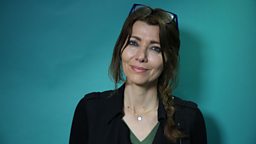
7. They are both advocates for being open about depression
Elif and Justin have both suffered from depression, and agree that talking openly has been key to recovery.
Forgiveness is more of a colour spectrum from the reds of hatred to the blues of peace and one is somewhere along it.Justin Welby
“I find it so important that you speak publicly about your own depression,” says Elif, who experienced postnatal depression after the birth of her first child. “When you go through a depression you think you’re the only one, that everyone else is ‘normal’.” But speaking makes you realise that this isn’t the case. “Overall, I think we need to talk about and write about different forms of depression and realise that we’re not alone,” says the writer.
For Justin, a book written by his eldest daughter about her own struggles with mental health – I Thought There Would Be Cake – gave him the encouragement he needed to open up about his own illness. “There was a chapter about the need to be open and to speak to others,” he says. “So I did, and I went to get some help, and that has made a huge difference.”
8. We have to take care of our “inner garden”
At the end of her 2017 Ted Talk, Elif spoke openly about being bisexual. For weeks afterwards she was attacked and slandered on social media and in the mainstream media in Turkey by ultra-nationals, Islamists and others. She has experienced this type of “lynching” as a result of her books too, when she’s tackled taboo topics like the Armenian genocide. “It’s not easy and I wouldn’t be telling the truth if I claimed that it doesn’t affect me at all,” she says. “It does affect me, and I think it effects all of us.”
One thing that helps her maintain inner peace in the wake of such abuse and hatred is taking care of her “inner garden.” “I think we all have an inner garden that we’re responsible for,” says the writer. “We need to cultivate that and we need to take care of our own mental health.”
She also holds on to the messages of support she receives, and tries to forget the “screaming.” “Amidst all the noise you also get whispers of love,” she says, like letters from parents of LGBT youth saying how glad they are that she spoke.
9. They have both worked hard to forgive their fathers
When Elif’s parents split, her father remarried and remained in France. He didn’t maintain a relationship with his daughter: she never got a birthday card, she has no pictures with him, she’s never been to his house. And yet he’s been a good father to his subsequent sons, is loved by many and has shown himself to be a “good human being.” It’s been hard to reconcile this with his absence from her own life. “That was very difficult for me to digest for a very long time,” says Elif. She doesn’t know if she forgave her father but she wanted him to have a relationship with his grandchildren, and so there has been a form of reconciliation.
Justin has worked hard to forgive his father too. “Reconciliation is the thing that really matters to me, which I define as the ability to disagree well and yet still love one another,” he says. “My own father was an alcoholic and fairly abusive and died when I was 21, and then I discovered many years later he wasn’t actually my father at all.”
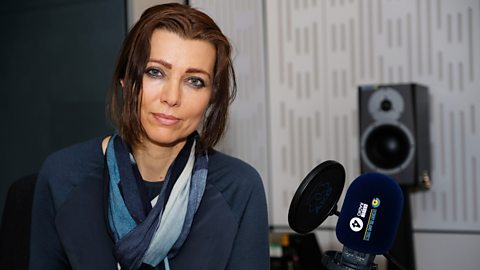
Elif Shafak: ‘The need to write goes all the way back to my childhood’
Writer Elif Shafak tells Kirsty Young how she began writing stories.
He believes forgiveness is hugely complicated: “Forgiveness is another area where it seems to me there’s a great danger of sharp lines. It’s more of a colour spectrum from the reds of hatred to the blues of peace and one is somewhere along it.”
Elif agrees: “It is a journey and some days maybe the red of hatred is the more dominant – but we need to aim for the blue.”
10. Elif believes it’s not whether we are angry that matters, but what we do with it
“I think we’re living in the age of existential angst,” says the author. But it’s not what we feel that matters but what we do with it, she argues: “It’s not whether you are angry or anxious – I think it’s impossible not to feel these emotions if we are following what’s happening in the world – but what do we do with our anger? What do we do with our frustration? What do we do with our sadness or anxiety?”
“Can we turn it into something more positive and constructive both for ourselves but also for our communities and societies and for our world?”
-
![]()
The Archbishop Interviews... Elif Shafak
In this series, the Archbishop of Canterbury, Justin Welby, has conversations with public figures whose work engages with big questions about humankind, and who have an interesting relationship with religion and spirituality. What do they believe and how does that shape their values and actions?

More deep conversations on Radio 4
-
![]()
Desert Island Discs: Peter Schmeichel
Peter Schmeichel, footballer, shares the eight discs, book and luxury item he would want with him if cast away on a desert island.
-
![]()
Desert Island Discs: Arsène Wenger
Arsène Wenger, the manager of Arsenal FC for 22 years, shares his eight discs, book and luxury with Lauren Laverne.
-
![]()
This Cultural Life: Brian Cox
Actor Brian Cox talks to John Wilson about the experiences and influences that have shaped his stage and screen career.
-
![]()
The Archbishop Interviews... Tony Blair
The former PM's faith was foundational to the values and principles that underpinned a remarkable political career.

